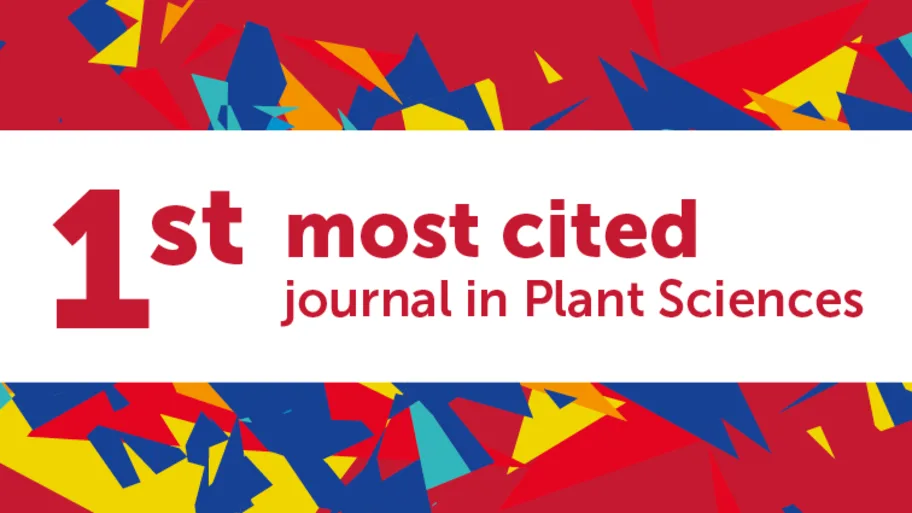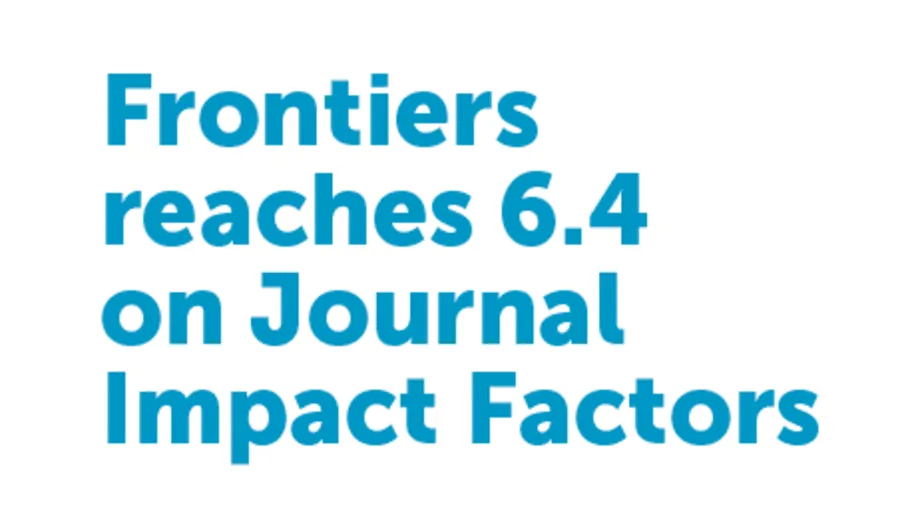
- Science news
- Frontiers news
- Quality and Impact Analysis: Frontiers in Plant Science
Quality and Impact Analysis: Frontiers in Plant Science
In just 5 years, Frontiers in Plant Science has become the 3rd largest and the 7th most-cited Plant Science journal in the world.
The Impact Factor (IF), defined as the total number of citations in a given year divided by the number of citable articles over the previous two-year period, is the most commonly accepted metric of journal quality (but not of an individual paper or researcher). It was formally established by the Institute for Scientific Information (ISI) in 1975. As the IF can be heavily skewed by a few highly-cited papers, total citations generated over the same two-year period provide a more accurate indication of the overall influence or impact of the articles published by a journal in a field. Frontiers is a pioneer in the use of article-level and author-level metrics and encourages every author to use these to track the development of his or her readership on a more granular level.
Analysis within the category of Plant Sciences
There are 204 journals are listed in the category of “Plant Sciences” in the 2014 Journal Citation Reports (JCR) published by Thomson Reuters in 2015. Frontiers in Plant Science is one of 33 Gold open-access journals.
Below are the results of our comparative analysis of these journals on the article volume published, impact factor (IF) achieved, and total number of citations reported, in 2014, based on articles published over the two preceding years, 2012 and 2013. (Click here to see the volume and number of citations of other Frontiers journals).
Comparison of impact factor and publication volume among all “Plant Sciences” open-access journals (33)

Figure 1. Frontiers in Plant Science compared with 32 other open-access journals listed in the “Plant Sciences” JCR category. The journal analysis is based on the 2014 Journal Citation Reports published by Thomson Reuters, 2015.
Comparison of impact factors and publication volume among all “Plant Sciences” journals (204)

Figure 2. Frontiers in Plant Science compared with 203 other journals (subscription and open access) listed in the “Plant Sciences” JCR category. The journal analysis is based on the 2014 Journal Citation Reports published by Thomson Reuters, 2015.
Comparison of total citations in 2014 for articles published in the previous two years among all “Plant Sciences” journals (204)

Figure 3. Top 20 most-cited journals in plant science in 2014. Citations in 2014 were counted for articles published in 2012 and 2013 in journals listed in the “Plant Sciences” JCR category; the analysis is based on the 2014 Journal Citation Reports, Thomson Reuters, 2015.
Summary
Among the 33 Gold open-access journals listed in the “Plant Sciences” category, Frontiers in Plant Science:
Ranks 1st in impact factor at 3.95. Frontiers in Plant Science is 4 times higher than the average for competing open-access “Plant Sciences” journals
Is the largest open-access journal – with an article volume 9 times larger than the average among open-access “Plant Sciences” journals
Among the 204 journals listed in the “Plant Sciences” category in JCR, Frontiers in Plant Science:
Is in the top 9% on impact factor – ranked 19th of 204 journals
Is the world’s 3rd largest plant science journal overall, publishing 6 times the average article volume among all “Plant Sciences” journals
Is the 7th most–cited journal in 2014, based on articles published in 2012 and 2013
In summary, Frontiers in Plant Science, one of the youngest journals publishing peer-reviewed scholarly plant science articles, has become the 3rd largest and 7th most–cited journal in its category, with an impact factor in the top 9%.
Further significance
The results are more significant if one considers that:
Frontiers does not engineer the IF by setting a rejection rate, and instead operates an impact neutral peer-review process.
The impact factor of Frontiers in Plant Science has been increasing from 3.637 in 2013 to 3.948 in 2014 JCR, despite doubling in volume over the period.
Key to success
At Frontiers, we publish all articles that are scientifically correct. We engineered the Collaborative Peer Review process with a review mandate focused on enhancing article quality by means of rigorous and constructive feedback from expert reviewers, as well as quick and direct interactions between authors, reviewers and the editor enabled by our review forum platform, and we enhance transparency by acknowledging reviewers and editors on the published articles. The analysis presented here indicates that the impact neutral Collaborative Peer Review conducted in Frontiers, together with an outstanding editorial board, has become a powerful model for publishing academic papers.
All of this is only possible with a stellar editorial board of researchers (see infographic). Frontiers congratulates Field Chief Editors Richard Jorgensen and Joshua Heazlewood, the outstanding board of Specialty Chief Editors, and the diligent work of the Associate and Review Editors (http://journal.frontiersin.org/journal/plant-science#editorial-board) for this spectacular achievement_._
A special congratulations also goes to Uwe Sonnewald and Wolf Frommer, the co-Field Chief Editors who formed and led Frontiers in Plant Science during its first few years.
Frontiers in Plant Science fact sheet (as of November 2015):
Website: | |
Launched: | January 28, 2011; core sections launched 2010-2012 |
Impact Factor: | 4.495 |
Number of sections: | 18 |
Number of Research Topics: | 270 |
Number of editors: | 3,905 |
Number of articles published: | 2,827 |
Number of article views: | 261,059 / month |
Number of article downloads: | 59,401 / month |
Chief Editors:
Richard Jorgensen, University of Arizona, USA | Field Chief Editor, Frontiers in Plant Science
Joshua Heazlewood, University of Melbourne, Australia | Field Chief Editor, Frontiers in Plant Science
Core Sections:
Diego Rubiales, Consejo Superior de Investigaciones Cientificas (CSIC), Spain | Specialty Chief Editor, Frontiers in Plant Science – Crop Science and Horticulture
Karina Vera Rosa Schafer, Rutgers University – Newark, USA | Specialty Chief Editor, Frontiers in Plant Science – Functional Plant Ecology
Maciej Andrzej Zwieniecki, University of California – Davis, USA | Specialty Chief Editor, Frontiers in Plant Science – Plant Biophysics and Modeling
Jens Kossmann, Stellenbosch University, South Africa | Specialty Chief Editor, Frontiers in Plant Science – Plant Biotechnology
James Lloyd, Stellenbosch University, South Africa | Assistant Specialty Chief Editor, Frontiers in Plant Science – Plant Biotechnology
Giulia De Lorenzo, Università degli Studi di Roma “La Sapienza”, Italy | Specialty Chief Editor, Frontiers in Plant Science – Plant Biotic Interactions
Simon Gilroy, University of Wisconsin – Madison, USA | Specialty Chief Editor, Frontiers in Plant Science – Plant Cell Biology
Elizabeth A. Kellogg, Donald Danforth Plant Science Center, USA | Specialty Chief Editor, Frontiers in Plant Science – Plant Evolution and Development
Neelima Roy Sinha, University of California – Davis, USA | Specialty Chief Editor, Frontiers in Plant Science – Plant Evolution and Development
Richard Jorgensen, University of Arizona, USA | Specialty Chief Editor, Frontiers in Plant Science – Plant Genetics and Genomics
Kazuki Saito, RIKEN Center for Sustainable Resource Science / Chiba University, Japan |Specialty Chief Editor, Frontiers in Plant Science – Plant Metabolism and Chemodiversity
Marta Wilton Vasconcelos, Universidade Católica Portuguesa, Portugal | Specialty Chief Editor, Frontiers in Plant Science – Plant Nutrition
Steven Carl Huber, USDA-ARS and University of Illinois, USA | Specialty Chief Editor, Frontiers in Plant Science – Plant Physiology
Andreas P M Weber, Heinrich-Heine-Universität, Germany | Assistant Specialty Chief Editor, Frontiers in Plant Science – Plant Physiology
Joshua Heazlewood, University of Melbourne, Australia | Specialty Chief Editor, Frontiers in Plant Science – Plant Proteomics
Rodrigo A Gutierrez, Pontificia Universidad Católica de Chile, Chile | Specialty Chief Editor, Frontiers in Plant Science – Plant Systems and Synthetic Biology
Markus Geisler, University of Fribourg, Switzerland | Specialty Chief Editor, Frontiers in Plant Science – Plant Traffic and Transport
Wendy A Peer, University of Maryland, USA | Specialty Chief Editor, Frontiers in Plant Science –Plant Traffic and Transport
Roger Deal, Emory University, USA | Specialty Chief Editor, Frontiers in Plant Science –Technical Advances in Plant Science
Cross-listed Sections:
P.K. Ramachandran Nair, University of Florida, USA | Specialty Chief Editor, Frontiers in Plant Science – Agroecology and Land Use Systems
Richard D Emes, University of Nottingham, UK | Specialty Chief Editor, Frontiers in Plant Science – Bioinformatics and Computational Biology
Samuel A Cushman, United States Forest Service, USA | Specialty Chief Editor, Frontiers in Plant Science – Evolutionary and Population Genetics






